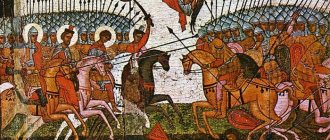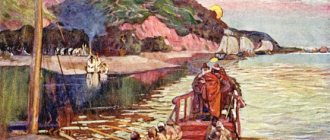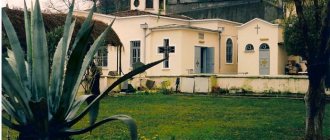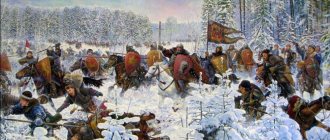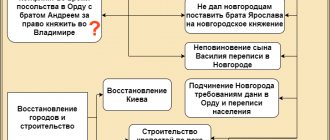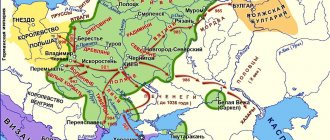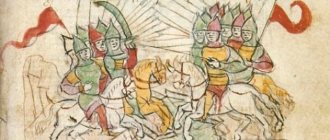| St. blgv. Dovmont Pskovsky |
Dovmont (Domant) of Pskov
, baptized
Timofey
(+ 1299), prince, holy believer. Commemoration on May 20 and in the Cathedral of Pskov Saints
He came from a family of Lithuanian princes and owned the Nalshchansky inheritance in Lithuania, professing paganism.
Later chroniclers mistakenly consider him the youngest son of Vel. Prince of Lithuania Mindaugas. He was married to the sister of Mindovg's wife, who was later taken from him by the latter. After the murder of Mindaugas, in which Dovmont was probably involved, he was forced to flee Lithuania in 1265 and with 300 Lithuanian families came to Pskov, where he was baptized with the name Timofey.
A year later, the Pskovites elected him as their prince for his valor and true Christian virtues.
In 1266, Dovmont defeated the Lithuanians on the banks of the Dvina and devastated the region of the prince. Gerdenya, taking his wife and sons captive.
Vel. book Yaroslav, dissatisfied with the unauthorized election of Dovmont, was preparing to expel him from Pskov, but due to the refusal of the Novgorodians to help him, he had to disband his troops. The following year, the Novgorodians even went with the Pskovites to Lithuania, under the leadership of Dovmont, who completed this campaign with glory.
In 1268, Dovmont was called upon by the Novgorodians to help against the Livonian knights and, together with Prince. He led Dimitri Alexandrovich and his squads. book Yaroslav, fought at Wesenberg.
In 1269, the Grand Master of the Order, having gathered significant forces, besieged Pskov. Dovmont bravely defended the city; Novgorodians came to the rescue, and led. the master, wounded by Dovmont himself, had to make peace. In 1270, Yaroslav, who did not like Dovmont, installed some Aigust in his place in Pskov, but the Pskovites again elevated Dovmont to prince.
In 1282, Dovmont, who had meanwhile married Maria, led his daughters. book Dimitri Alexandrovich, helped his father-in-law, driven out from the grand-ducal throne by his younger brother Andrei; Dovmont invaded Ladoga with a handful of soldiers, took Dimitri’s treasury from there and returned to him in Koporye, but, besieged by the Novgorodians, he had to leave the fortress. After this, the chronicles do not mention Dovmont for 17 years.
The valiant prince-warrior won his last victory on March 5, 1299 on the banks of the Velikaya River, where he and a small retinue defeated a large Livonian army. A day earlier, the knights unexpectedly attacked the settlement near Pskov, captured the suburban Snetogorsky and Mirozhsky monasteries and burned them, brutally dealing with the inhabitants, wives and children hiding there. They killed the founder of the Snetogorsky monastery, the Monk Joasaph, with 17 monks and the Monk Vasily, abbot of Mirozh. Holy Prince Dovmont, without waiting for the large Pskov army to gather, went out to meet the enemy with his retinue and expelled the sacrilege beyond the Russian land.
A few months later, the holy noble prince Dovmont-Timofey died and was buried in the Trinity Cathedral of Pskov. The chronicle testifies that “then there was great pity in Pleskov for husbands and wives, and small children for the good lord, noble prince Timothy.”
The people of Pskov recalled how the holy prince took care of them in days of peace and especially when the city was in danger, how he led them into battle with the words:
“Good men of Pskov!
Whoever is old is my father, whoever is young is my brother. Let’s stand for the Holy Trinity!” The relics of the holy noble prince Dovmont-Timothy rest in the Pskov Cathedral of the Life-Giving Trinity. Next to the relics of the blessed prince in the Trinity Cathedral hung his battle sword (the sword is currently kept in the Pskov Historical, Artistic and Architectural Museum-Reserve), which was presented to the Pskov princes in the Church of the Holy Trinity upon enthronement.
Performance evaluations
For 33 years, Dovmont ruled Pskov and was the only prince in the entire history of the city who managed to live for so long in peace and harmony with the Pskov Assembly. He was fair and strictly monitored the justice of others, generously gave alms, accepting the poor and strangers, reverently honored church holidays, patronized churches and monasteries, and himself founded a monastery in honor of the Nativity of the Blessed Virgin Mary.
Prince Dovmont, like Saint Alexander Nevsky, was a glorious defender of the Russian land. The main merit of the blessed Prince Dovmont as a commander and statesman is that for many years he reliably defended the northwestern border of the Russian state from enemy attacks. Before each battle, Saint Dovmont came to the temple, placed his sword at the foot of the holy throne and accepted the blessing of the confessor, who girded the sword for him.
Saint Dovmont made the Pskov fortress impregnable. In memory of the glorious defender of the city, the stone defensive wall erected by the holy prince near Krom at the end of the 13th century was named Dovmontova, and the territory enclosed by the wall is still called Dovmontov’s city. The holy defender of the “House of the Holy Trinity” had another pious custom: in gratitude to the Lord, in whose name he won victories without knowing defeat, the noble Prince Dovmont erected churches next to the Kremlin in honor of the saint on whose memory day he won the victory. Other residents of Pskov also erected churches there for special vows. The small territory of the present Dovmontov city was completely covered with temples. (The first church in honor of St. Dovmont-Timothy was built in the city of Dovmont in 1574.)
Biography
Dovmont (Prince of Pskov) was the son of Mindovg and the brother of Voyshelk, according to some sources, and according to others, a relative of Troyden. He himself was from Lithuania and owned the Nalshansky inheritance. According to one version, Dovmont was married to the sister of Mindovg’s wife. The Chronicle of Bykhovets says that he was married to the sister of Narimont’s wife. According to chronicles, Dovmont took a direct part in the murder of Mindaugas in 1263. Later he fell out of favor with Voyshelk. The latter in 1264 began to be considered the most powerful prince in Lithuania.
Heavenly protector of the Pskov Land
Soon after the death of the prince, veneration of him began as a holy intercessor before God, prayerfully protecting our land from enemies and disasters. More than once, even after death, the holy prince defended Pskov. So, in 1480, when more than a hundred thousand Germans besieged the city, he appeared in a dream to one townsman and said: “Take the robe (cover) of my coffin, carry it three times around the city with crosses and do not be afraid.” The Pskovites carried out his instructions and the Germans retreated from the city. After this miraculous deliverance from enemies, a service was compiled for the holy prince.
The holy noble prince Dovmont-Timothy and his wife, in the schema of the Venerable Martha (+ 1300) received the special honor of being depicted on the miraculous Mirozhskaya icon of the Mother of God: “It was good for the most pure image of your miraculous icon, the Mother of God, to be painted in our likeness in the battles of the steadfast intercessor Prince Domant with a pious spouse"
[1]. At the appearance of the Mother of God to Elder Dorothea during the siege of Pskov by the Poles on August 27, 1581, the holy noble prince Dovmont-Timofey was among the chosen ones of God who accompanied the Heavenly Intercessor of Pskov.
Capture of Polotsk
Dovmont (Prince of Pskov) led a squad and “three ninety” military men. David Yakunovich was with them, and Luka Litvin was with the Lithuanians. The army made its way unnoticed through the dense forests stretching from the river. Great to the Dvina. Dovmont would not have had enough strength to suddenly capture the large and strong Polotsk. However, he managed to capture Gerdeni's wife and children. Having captured rich booty along the way, he left Polotsk. All the convoys managed to cross the Dvina while Gerdenya was gathering allies. Across the river, Dovmont stopped and released the booty and prisoners to Pskov with part of his warriors. Soon the Lithuanians appeared. The guards notified Dovmont in time. He gathered the cavalry and unexpectedly struck the Lithuanians. The enemies did not even have time to take order. Thus, with little bloodshed (only one Pskov resident was killed), Dovmont won his first victory.
Defense of Albazin
In 1640, the great popular movement to the East - “meeting the sun” - ended with Russian explorers reaching the mouth of the Amur and the Pacific Ocean. Rus' in those parts collided with pagan China. The Russian fortress of Albazin, glorified by the miraculous Albazin Icon of the Mother of God and the heroic “Albazin defense” (1685-1686), became a stronghold of Orthodoxy.
...In the summer of 1679, at Petrov's post, a detachment of Cossacks led by Gavrila Frolov set off from Albazin to explore the valley of the Zeya River. For three years, the Cossacks carried out patrol duty on Zeya, traveled around the surrounding villages, brought the Tungus population under Russian citizenship, and founded winter huts and forts. One day, a Cossack patrol met in the mountains two riders on white horses, clad in armor, armed with bows and swords. These were Saint Vsevolod and Saint Dovmont. Having entered into a conversation with the Cossacks and learned that they were from Albazin, the holy prince-warriors predicted the subsequent invasion of Chinese troops on the Amur, a difficult defense and the final triumph of Russian weapons. “And the Chinese will come again, there will be attacks and great battles, and in those battles we will help the Russian people. But the Chinese will not take the hail.”
Several times in 1684-1686. Chinese hordes approached Albazin, but did not take the city. With the miraculous help of the Albazin Icon of the Mother of God and the holy princes Vsevolod and Dovmont of Pskov, the enemy onslaught was helplessly smashed against the Far Eastern Orthodox stronghold. “The Tale of the Miracles of the Holy Blessed Grand Dukes Vsevolod and Dovmont” was recorded by Gavrila Frolov in Yakutsk on October 23, 1689.
Troparion Blgv. book Dovmont in St. Baptism of Timothy, Pskov
Having hated the wickedness of our father, / the blessed Prince Dovmont, / and avoided the nights of passion, even striving for idols, / came in thought to the Sun of glory - Christ, / illuminated by the grace of Divine Baptism, / and now standing in the light of the Most Holy Trinity, / pray to Christ God to preserve and save the Orthodox people / and your city from the godless Hagarians, / and Latin invasions, and internecine wars / and save our souls.
New campaign
In 1267, Russian commanders moved to Lithuania. The border regions of the state were devastated. The Lithuanians not only failed to defend their lands, but also did not gather in pursuit. As the chronicles testify, the Novgorodians and Pskovites fought a lot that year, and arrived with booty and without losses. There have not been such bloodless and successful campaigns on the border for a long time. The Lithuanians stopped their raids for a long time.
"Peace" with the Germans
Having frightened Lithuania, Dovmont (Prince of Pskov) decided to join the great army in the fight against the crusaders. The cause of the battles was the actions of the Danish knights, who settled in the coastal cities of Rakovor and Kolyvan. They greatly interfered with Novgorod's trade.
In the winter of 1268, Russian commanders and their troops gathered near the walls of the city. The militia also gathered. They were commanded by Mikhail Fedorovich (posadnik) and Kondrat (tysyatsky). According to information from the chronicles, the army numbered about 30 thousand people. The Germans sent envoys to negotiate peace. According to the agreement, they agreed not to help the Rakovorians and Kolyvanians - the king’s people. This suited the Novgorodians, since the main target was the Danish knights. For the Russian army it was important to break off the Germans. In January, on the 23rd (1268), the warriors moved to Rakovor. The journey to Narva took three weeks. The governors allowed people to rest while they were on their land. The army crossed the border without fighting. The knights themselves did not dare to go out into the field, but hid behind the tower walls.
When Saint Prince Dovmont died, there was great mourning in Pskov
The noble Prince Dovmont died a few months after the victory at Pskov. According to the official chronicle version, this happened on May 20, 1299, and death occurred from wounds. Other sources say that the noble prince died from the pestilence that then decimated the people in Pskov.
Armor found during archaeological excavations in the Dovmont Tower and attributed to Prince Dovmont-Timofey. Found plates and reconstruction option. Chronicles claim that Prince Timofey-Dovmont died from wounds received in battle. When this happened, there was mourning in Pskov for several days. The people of Pskov mourned their beloved prince. Photo: pravoslavie.ru
The chronicle says that the Pskovites bitterly mourned their prince. The historical text talks about it like this: “then there was great pity in Pleskov for husbands and wives, and small children for the good lord, noble prince Timothy.”
In addition, the residents of Pskov also kindly recalled how Dovmont treated them in peaceful days, that he judged fairly and did not pity the weak. He led them into battle with the words: “Good men of Pskov! Whoever is old is my father, whoever is young is my brother. Let’s stand for the Holy Trinity!”
Battle with the German army
On February 17, the army stopped at the river. Skittles. In the morning, a German army suddenly appeared nearby. She lined up in an ominous "pig". The signed peace was thus violated by the Germans themselves.
The Russian regiments adopted the usual order - “chelo”. In the center stood the militia, and on the right and left sides were mounted squads. Nevsky lined up the army in the same order before the Battle of the Ice. However, this formation was also known to the Germans.
Dmitry Pereyaslavsky, who was the leader of the Russian army, placed a relatively small Tver squad on the left, and took the remaining cavalry regiments to the right wing so that the blow from this side would be unexpected and strong. Here he himself stood up. Dovmont (Prince of Pskov) was also in the right wing.
The beginning of the battle was like the Battle of the Ice. The Germans crashed into the Russian "head". The Novgorodians fought under heavy enemy pressure. The losses were heavy, but the Germans did not manage to break through the “brow”. As a result, the knightly ranks scattered, and everyone fought alone. Novgorodians on foot tore them from their saddles. Here, from the left, Mikhail’s Tver squad entered the battle. For the Germans, however, this was not a surprise. Reserve detachments went to meet Mikhail. Then, on the other side, the cavalry entered the battle: Pskovites, Vladimirites, Pereyaslavlites. This blow was so unexpected and strong that the knights began to retreat in panic. They managed to escape from complete defeat as another German army began to approach. The Russian squads had to stop the chase in order to reorganize. However, the Germans did not dare to attack. The battlefield, covered with corpses and covered in blood, frightened them so much that they stopped on the other side of the field and stood there until dark. At night the knights left. The sent Pereyaslav patrols did not find them either in 2, or 4, or even 6 hours of travel.
Saint Dovmont of Pskov is usually depicted on icons as an elderly man
The iconography of the holy noble prince Dovmont is of Pskov origin and reflects the local nature of his veneration. It did not become widespread outside the Pskov land.
Individual icons of Dovmont of Pskov are extremely rare. The main part of the images of the saint are part of complex compositions. They include images of Pskov saints. In addition, he is also often depicted together with the blessed prince Vsevolod or with his wife the blessed princess. Maria.
Fresco “The Holy Blessed Prince Dovmont-Timofey of Pskov” in the Church of St. Nicholas the Mokroy (XVII century) in Yaroslavl. On icons, Saint Prince Dovmont of Pskov is usually depicted as an elderly man with a beard and a sword. Photo: pravoslavie.ru
Since Dovmont died as an elderly man, he is usually represented as an old man with a long beard that tapers to a point. The hair on the head is divided into several strands. The forehead is high and bald in front. Dovmont of Pskov is presented without a hat in princely clothes. He often holds a sword in his hands as a symbol of defending the Christian faith.
Literature
- Dovmont // Encyclopedic Dictionary of Brockhaus and Efron: in 86 volumes (82 volumes and 4 additional). - St. Petersburg, 1890-1907.
- Okhotnikova V.I.
The Tale of Dovmont: Research and Texts / V.I. Okhotnikova; resp. ed. L. A. Dmitriev; USSR Academy of Sciences, Institute of Russian Literature (Pushkin House). — L.: Science. Leningr. department, 1985. - 232 p. — 13,800 copies. (region) - Rakhmanin T.
[vivaldi.pskovbook.ru/dovmont.pdf/details The Tale of the Forgotten Prince. “We will not tolerate being offended”: a historical novel.] T. 1-2 - Pskov: Logos Plus, 2013. - 467 p. -ISBN 978-5-93066-052-4
Saint Dovmont won his last victory at Pskov
In 1282, Prince Dovmont married Maria, daughter of Grand Duke Dimitri Alexandrovich. He helped his aunt return the grand-ducal table seized by his brother Andrei.
To do this, a warrior with a small group of warriors invaded Ladoga, took Dimitri’s treasury from there and returned to him in Koporye. In response, the Novgorodians besieged the Koporye fortress, and the prince had to leave it. After this, the chronicles do not mention Dovmont for 17 years.
Episode of the Battle of Rakovor. Miniature from the Front Chronicle of the 16th century. The holy noble prince Timofey-Dovmont took part in many battles, but his last was the battle of Pskov. Photo: encyclopedia.mil.ru
It is known that the Grand Duke of Lithuania Timofey, as Dovmont is called in some chronicles because after the murder of Mindaugas he was his successor for some time, won his last battle on March 5, 1299. This happened on the banks of the Velikaya River. Here he and a small squad defeated a large Livonian army.
After the siege of Koporye by the Novgorodians, the chronicles did not mention the holy Prince Dovmont for 17 years.
Earlier, the Livonians made a surprise attack on the settlement near Pskov, capturing the suburban Snetogorsky and Mirozhsky monasteries. They burned them and brutally dealt with the inhabitants, their wives and children hiding there. In addition, they also killed 17 monks and the founder of the Snetogorsk monastery, St. Joseph, as well as St. Basil, abbot of Mirozh. Holy Prince Dovmont, without waiting for the large Pskov army to gather, went out to meet the enemy with his retinue and expelled the sacrilege beyond the Russian land.
Dovmont: talented commander, pagan, Orthodox saint
Dovmont or Domant, baptized Timofey. This is a Pskov prince, descended from the princes of the Grand Duchy of Lithuania. He ruled in Pskov from 1266 to 1299. He became famous for his numerous victories, including in such a famous battle of the Middle Ages as the Battle of Rakovor.
Image of the holy noble prince Timofey-Dovmont in the Trinity Cathedral of Pskov. Prince Dovmont became famous as a Pskov prince, a fighter against the invasion of the Crusaders, and also as a saint. Photo: upload.wikimedia.org
Information about Dovmont’s life is contained in chronicles and biographies of various origins. The most detailed story about him is contained in the Ipatiev Chronicle, which tells about the murder of King Mindaugas by Dovmont.
Historical chronicles, as well as fiction, paint the image of the prince as “a man of valor and impeccable honor, fierce against the Germans to the point of death.” Under him, the Pskov land actually got rid of dependence on Novgorod. Timofey Dovmont was a Lithuanian pagan, but was baptized and canonized by the Orthodox Church for his deeds.
They pray to the blessed Dovmont of Pskov for help in military affairs and administrative affairs
During his lifetime, the holy noble prince Dovmont of Pskov became famous as a great warrior, a pious Christian, and patron of churches and monasteries. That is why they pray to him for gaining wisdom, for help in military matters, as well as in managerial affairs. In addition, the saint is the patron saint of Pskov, the sovereign's people and the Orthodox army.
Video: Holy Blessed Prince Dovmont of Pskov. At 40 seconds, the author begins to talk about the holy noble prince Timofey-Dovmont, the heavenly patron of Pskov.
The text of the prayer to the blessed prince Dovmnot (Timofey) of Pskov is as follows:
“Oh, marvelous servant of God in the saints, Holy Blessed Prince Dovmont! Hear us who come running to you and ask for your help. We know that your prayer is strong before God, and your love for your people is great.
With this prayer, during the days of your wondrous life, you performed miracles of courage, with this love for people you inspired them to follow you, to imitate you in everything, to listen to you like your father and always do the will of the Lord.
So even now, after your death, do not leave us orphans, without your fatherly intercession, do not take away your love from us for our negligence towards you, as towards our father, given to us by God. Be sad - a good comforter, defenseless - a shield and fence, helpless - help and intercession.
When our enemies, visible and invisible, begin their battle with us, with your prayers, as in ancient times, the city of Pskov protected our soul with its cover, and put fear on them, so that they may fall away from their thoughts of evil deeds to us.
Gird us too, as with your sword to repel these enemies, with prayer, fasting and good deeds. May we prosper in our spiritual work and give thanks to the Lord God, who has given us you, a prayer book and intercessor for us, such as our teacher, and let us worship Him, who lives forever. Amen."
By leaving a comment, you accept the user agreement
